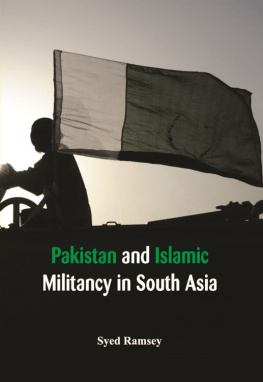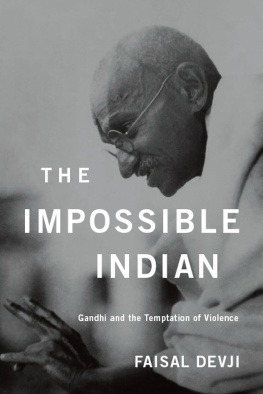Devji - Landscapes of the Jihad: Militancy, Morality, Modernity
Here you can read online Devji - Landscapes of the Jihad: Militancy, Morality, Modernity full text of the book (entire story) in english for free. Download pdf and epub, get meaning, cover and reviews about this ebook. City: Cornell University Press, publisher: Cornell University Press, genre: Politics. Description of the work, (preface) as well as reviews are available. Best literature library LitArk.com created for fans of good reading and offers a wide selection of genres:
Romance novel
Science fiction
Adventure
Detective
Science
History
Home and family
Prose
Art
Politics
Computer
Non-fiction
Religion
Business
Children
Humor
Choose a favorite category and find really read worthwhile books. Enjoy immersion in the world of imagination, feel the emotions of the characters or learn something new for yourself, make an fascinating discovery.
Landscapes of the Jihad: Militancy, Morality, Modernity: summary, description and annotation
We offer to read an annotation, description, summary or preface (depends on what the author of the book "Landscapes of the Jihad: Militancy, Morality, Modernity" wrote himself). If you haven't found the necessary information about the book — write in the comments, we will try to find it.
Devji: author's other books
Who wrote Landscapes of the Jihad: Militancy, Morality, Modernity? Find out the surname, the name of the author of the book and a list of all author's works by series.
Landscapes of the Jihad: Militancy, Morality, Modernity — read online for free the complete book (whole text) full work
Below is the text of the book, divided by pages. System saving the place of the last page read, allows you to conveniently read the book "Landscapes of the Jihad: Militancy, Morality, Modernity" online for free, without having to search again every time where you left off. Put a bookmark, and you can go to the page where you finished reading at any time.
Font size:
Interval:
Bookmark:
I owe many debts of gratitude to those who helped me in writing this book. My interest in the ethics and politics of modern Islam was first stimulated and directed by Fazlur Rahman, my teacher at the University of Chicago. Among those who read earlier drafts of various chapters and responded with guidance and suggestions are Arjun Appadurai, Carol Breckenridge, Leslie Dunton-Downer, Javed Gaya, Thomas Blom Hansen, Ronald Inden, Sanjay Iyer, Naveeda Khan, Uday Mehta, Satya Pemmaraju, Omar Qureshi, Vyjayanthi Rao, Arshia Sattar and Neguin Yavari. Even before deciding to write on this subject, I had discussed many of its themes with Rizwan Ahmad. I owe thanks also to my editor at Hurst, Michael Dwyer, for his advice and encouragement, to Rachel Dwyer for keeping such a fine menagerie, and to the anonymous reviewers of my manuscript. In Mumbai Christophe Carvalhos generous hospitality was matched only by his skill in finding a quiet place where I could write.
I am grateful also for the support of the Yale Center for International and Area Studies and especially to its Committee on South Asian Studies.
| New Haven, March 2005 | FAISAL DEVJI |
Of related interest
Globalised Islam
The Search for the New Ummah
Olivier Roy
This new book provides one of the best and most detailed snapshots of real existing Islam currently available. (The Guardian)
xii, 352pp. 2004 185065 5987
Islamist Networks
The Afghan-Pakistan Connection
Olivier Roy and Mariam Abou-Zahab
a richly detailed analysis [] Roy and Abou-Zahab argue convincingly that, while Iraqs insurgency may be of rising importance, Pakistan continues to be the central point of mobilisation of the Islamic radicals. (Washington Post)
x, 144pp. 2004 185065 7041
Revolution Unending
Afghanistan, 1979 to the Present
Gilles Dorronsoro
This magnificent work of research and interpretation deserves to become a classic in the field. (Anatol Lieven)
viii, 370pp. 2005 185065 7033
Islamism and its Enemies in the Horn of Africa
Alex de Waal (ed.)
A scholarly and critical analysis of Islamism in Sudan and the Horn of Africa, linking it with its roots in Egypt and unravelling its ideological, sociological and political facets. (Patrick Gilkes, BBC World Service)
xvi, 252pp. 2004 185065 7319
Pakistan: A Modern History
Ian Talbot
The fiftieth anniversary of a state is an appropriate time to write a history of that state. Ian Talbot has done so for Pakistan and has done a superb job. (American Historical Review)
x, 436pp. 1999/2005 185065 3852
HURST & COMPANY, LONDON
Crises in World Politics
TARAK BARKAWI
JAMES MAYALL
BRENDAN SIMMS
editors
GRARD PRUNIER
Darfurthe Ambiguous Genocide
FAISAL DEVJI
Landscapes of the Jihad
MARK ETHERINGTON
Revolt on the Tigris
AHMED HASHIM
Insurgency and Counter-Insurgency in Iraq
Towards the end of The 9/11 Commission Report its authors make the following remarks about the globalization of Al-Qaedas jihad:
The 9/11 attack was an event of surprising disproportion. [] It was carried out by a tiny group of people, not enough to man a full platoon. Measured on a governmental scale, the resources behind it were trivial. The group itself was dispatched by an organization based in one of the poorest, most remote, and least industrialized countries on earth. [] To us, Afghanistan seemed very far away. To members of al Qaeda, America seemed very close. In a sense, they were more globalized than we were.
It was indeed the surprising disproportion between Al-Qaedas severely limited means and seemingly limitless ends that made a global movement of its jihad. And therefore it was the very distance between a poor country like Afghanistan and a rich one like America that made its members more globalized than we were. Such a thesis is not paradoxical, since all it does is recognize that the local causes of Al-Qaedas jihadmen, money, motives and munitions alikehave vanished into the immensity of their own global effects. This jihad is global not because it controls people, places and circumstances over vast distances, for Al-Qaedas control of such things is negligible, as The 9/11 Report testifies, but for precisely the opposite reason: because it is too weak to participate in such a politics of control. For an instrumental politics of this sort to be possible, after all, some proportion between its causes and effects is required, whereas the global consequences of Al-Qaedas jihad have outstripped its local causes, and so have exceeded its intentions, to take on a life of their own well beyond the politics of control.
Politics had dealt with moments of excess in the past, when the unintended consequences of its actions spun out of control, but these moments did not displace political intentionality as such. So while there is nothing new in the story of consequences that outstrip their causes, creating a landscape of their own beyond any politics of control, Al-Qaedas jihad has become globalized only within such a landscape of unintended and even accidental effects. Terrorist movements of the past, whose equally dispersed acts of violence were intended to keep their causes at the centre of international concern, had also stretched the link between these causes and their effects to breaking-point. A telling example of this is found in Jean Genets memoir of the Palestinian movement in the 1970s, which before the intifada was dominated by expatriate groups. Its politics, too, was expatriated in acts of international terrorism, for whose effects the often unseen and inaccessible Palestinian homeland functioned as an almost mythical cause. At least this is how Genet describes the fantasies of Palestinian militants whom he knew:
Our Palestinian graves have fallen from planes all over the world, with no cemeteries to mark them. Our dead have fallen from one point in the Arab nation to form an imaginary continent. And if Palestine never came down from the Empire of Heaven to dwell upon earth, would we be any less real?
So sang one of the fedayeen, in Arabic.
The lash of outrage was urgent. Yet here we are, a divine people, on the brink of exhaustion, sometimes close to catastrophe, and with about as much political power as Monaco, answered another.
We are the sons of peasants. Placing our cemeteries in heaven; boasting of our mobility; building an abstract empire with one pole in Bangkok and the other in Lisbon and its capital here, with somewhere a garden of artificial flowers lent by Bahrain or Kuwait; terrorizing the whole world; making airports put up triumphal arches for us, tinkling like shop doorbellsall this to do in reality what smokers of joints only dream of. But has there ever been a dynasty that didnt build its thousand-year reign on a sham?
So sang a third fedayeen.
The disproportion between a Palestinian cause with about as much political power as Monaco, and the international terror that was its effect, certainly bears comparison to Al-Qaedas jihad. Also com-parable was the national cause of Palestine being rendered mythical within its own international effects. Yet these Palestinian excesses were finally legitimized within an order of intentionality dedicated to the establishment of a national state. What makes todays jihad different is the increasing ordinariness of such excesses, whose global effects exist outside the politics of control, and which are detached from its traditional categories, like that of statehood. As the kind of acts that have moved beyond the rationality of intentions, such excesses now characterise the totality of the jihads action, which has lost intentionality because it has lost control over its own global environment. For instance the attacks of 9/11, im-maculately planned and executed though they were, lacked intentionality because Al-Qaeda could neither control nor even predict their global repercussions. Hence the actions of this jihad, while they are indeed meant to accomplish certain ends, have become more ethical than political in nature, since they have resigned control over their own effects, thus becoming gestures of duty or risk rather than acts of instrumentality properly speaking. This might be why a network such as Al-Qaeda, unlike terrorist or fundamentalist groups of the past, has no coherent vision or plan for the future.
Font size:
Interval:
Bookmark:
Similar books «Landscapes of the Jihad: Militancy, Morality, Modernity»
Look at similar books to Landscapes of the Jihad: Militancy, Morality, Modernity. We have selected literature similar in name and meaning in the hope of providing readers with more options to find new, interesting, not yet read works.
Discussion, reviews of the book Landscapes of the Jihad: Militancy, Morality, Modernity and just readers' own opinions. Leave your comments, write what you think about the work, its meaning or the main characters. Specify what exactly you liked and what you didn't like, and why you think so.










